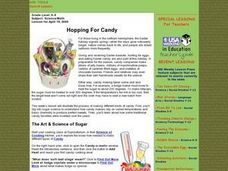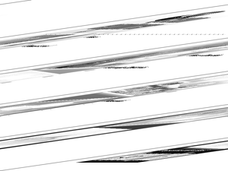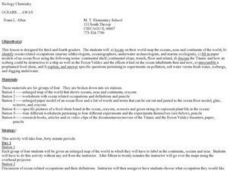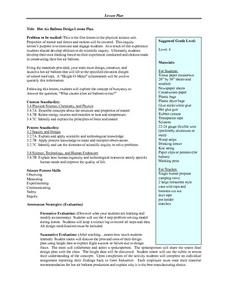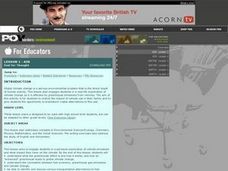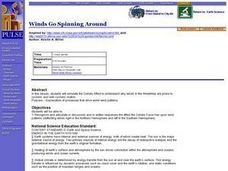Curated OER
Hopping For Candy
Students explore recipes online for different types of candy, and simulate process of making candy to explain how candy makers rely on varied temperatures and basic chemistry to produce perfect sweets.
Curated OER
Reduced Fare
Students discover the relationship between tectonic plate boundaries and the communities of life that thrive at such boundaries. In this biology lesson, students find that methane from oxidized carbon in sediments provides nutrients for...
Curated OER
Freshwater Sharks Bite Children at 35th Beach. A Play
Students delve into a study of sharks. In this science lesson plan, students examine the many different scientific occupations, as well as some possible specializations therein, and perhaps a little bit of other life considerations,...
Curated OER
Oceans Away
Students explore oceans. In this science lesson plan, students locate oceans, seas and continents of the world, identify ocean-related occupations, and complete activities pertaining to food chains as well as pollution.
Curated OER
Candy Bar Subsurface Geology
High schoolers are introduced to drawing and interpreting topographical maps. They each cut through there Jell-o mountain at regular height intervals, and trace around the shape of the Jell-o cut off at the height, overlaying the...
Curated OER
Basic Vitamins: Water-Soluble and Fat-Soluble
Students examine vitamins and study their functions and food sources. They research what happens to vitamins when foods are overcooked. They prepare a microwaveable vegetable quiche.
Curated OER
Cells: Structures and Processes
Students explore the basic unit of life, the cell in this nine lessons unit. The cell structure of animal and plant cell functions and how they affect our world are probed in this unit.
Curated OER
Hot Air Balloon Design Lesson Plan
Sixth graders discuss what they know and what they want to know about hot air balloon using a KWL chart. They then use a wide array of materials to design a hot air balloon that will lift successfully in cooperative groups referring to...
Curated OER
What is Soap?
Students investigate soap, how it is made and its structure. In this soap lesson, students observe a demonstration of soap being made. Students observe the properties of soap and how soap performs in "real-life" situations like cutting...
Curated OER
Motion: Speed, Velocity, Acceleration and Networking
Students interpret a variety of motion graphs. In this physics lesson, students calculate the speed and acceleration of objects using numerical data from graphs. They apply what they have learned to solve real world problems.
Curated OER
Air: Fuel For Thought
Students consider the impact of vehicle use in their family and brainstorm viable alternatives to this use. They calculate the total emissions for their family cars during the week, then compare those totals with Hybrid car totals.
Curated OER
Exponential Decay
Students study exponential decay and its application to radiocarbon dating. In this exponential decay lesson, students use candy to model the time it takes for something to decay. Students also graph the data they collect and describe...
Curated OER
Physical vs. Chemical Changes
In this chemical reactions instructional activity, students read about the differences between physical and chemical changes in substances. Then students identify situations as either an example of physical or chemical change. Students...
Curated OER
Physical vs. Chemical Changes and "The Code"
In this chemical and physical change worksheet, learners read about the differences between substances going through physical changes vs. chemical changes. They are given examples of each and evidence to look for in chemical changes....
Curated OER
Activity #9 Extending Oil Well Production
Middle schoolers simulate methods used to extend the effective life of an oil well by extracting less available oil. They identify techniques which can be used and evaluate their effectiveness. Pupils are introduced to rock size and...
Teach Engineering
Concentrate This! Sugar or Salt...
Heat up your lessons on boiling points. The resource provides a three-part activity: first, groups find the boiling point of solutions; second, they create boiling point curves for salt and sugar solutions; and third, they mix a solution...
Curated OER
Atoms and Their Interactions
In this atoms worksheet, students will review the characteristics of elements, atoms, and isotopes. Then students will compare the difference between ionic and covalent bonds. Finally, students will balance a chemical equation. This...
Curated OER
Tread Lightly: Where We Stand
Students explore the concept of ecological footprints. In this environmental stewardship lesson, students calculate their ecological footprints and consider how to reduce them.
Curated OER
Carbon: Structure Matters
Students read the Who We Are Section on Calfee Designs Webpage and discuss carbon usage. They work in pairs to look up the minerals diamond and graphite then create a chart on the properties of each mineral then compare how they differ...
Curated OER
Mobile Phones
Investigate how mobile phones impact their lives through this technology instructional activity that has students discuss the history of the cell phone and research how cell phones are being used in third world countries. Students create...
Curated OER
Water and Diffusion
In this water and diffusion activity, students will explore the characteristics of water and the water molecule. Students will also answer questions about diffusion and the movement of materials due to concentration differences. This...
Curated OER
Winds Go Spinning Around
Students simulate the Coriolis Effect to comprehend why winds in the Westerlies are prone to cyclonic and anti-cyclonic motion. They arrive at an explanation of processes that drive world wind patterns
Curated OER
Indra Nooyi
In this Indra Nooyi worksheet, learners read about the life of the CEo of Pepsi, then complete a variety of comprehension activities. An answer key is included.
Curated OER
Diameter, Radius and Area
Students calculate the diameter, radius and area of a circle. In this geometry lesson, students investigate the different ratios of a circle. They calculate the surface are of each circle.


